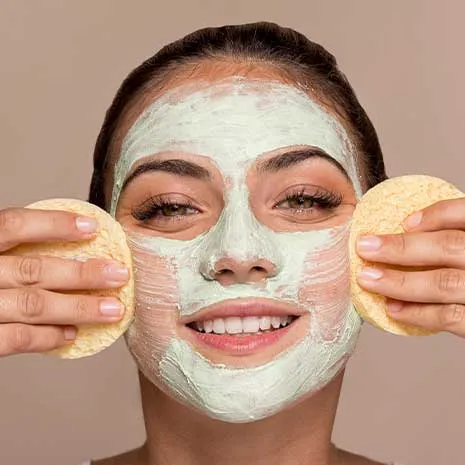Natural Face Masks for Vitiligo: Safe and Effective Home Remedies

Natural Face Masks for Vitiligo: Safe and Effective Home Remedies
- 21 August 2025
- 268

The Role of Natural Masks in Vitiligo Care
Vitiligo is a chronic skin condition caused by the loss of melanocytes, the pigment-producing cells in the skin. While medical treatments like phototherapy and topical immunomodulators are essential, many patients explore natural options — especially for daily skin care.
Homemade natural face masks are not a cure for vitiligo. However, they can play a supportive role by moisturizing the skin, reducing inflammation, and providing antioxidant protection.
Scientifically Supported Natural Mask Ingredients
Below are home remedies using natural ingredients known for their antioxidant, soothing, or immune-modulating effects. While results may vary, these masks are generally safe when used properly.
Note: Always test any mask on a small area of skin before full application.
1. Aloe Vera and Vitamin E Mask
Purpose: Moisturizes and soothes the skin, reduces inflammation
Ingredients:
- 1 teaspoon fresh aloe vera gel
- 1 capsule of vitamin E (oil extracted)
Application:
Mix and apply to the affected areas. Leave on for 20 minutes, then rinse with lukewarm water. Use 2–3 times a week.
Scientific Insight:
Aloe vera contains acemannan, which supports skin regeneration. Vitamin E is a strong antioxidant that may reduce oxidative stress on melanocytes.
2. Turmeric and Coconut Oil Mask
Purpose: Antioxidant protection and anti-inflammatory support
Ingredients:
- 1 teaspoon turmeric powder
- 1 teaspoon cold-pressed coconut oil
Application:
Mix into a paste, apply gently to the skin, and wait for 15–20 minutes. Rinse thoroughly to avoid yellow staining. Use 1–2 times weekly.
Scientific Insight:
Curcumin, the active component of turmeric, has shown antioxidant properties and potential melanocyte protection in studies.
3. Black Seed Oil and Yogurt Mask
Purpose: Supports skin microbiota and immune modulation
Ingredients:
- 1 tablespoon plain yogurt
- 1 teaspoon black seed oil (Nigella sativa)
Application:
Apply the mixture to the vitiligo patches and leave it for 15 minutes. Rinse with lukewarm water. Apply 2–3 times a week.
Scientific Insight:
Thymoquinone, found in black seed oil, may protect melanocytes and modulate immune responses. Yogurt supports skin-friendly bacteria.
4. Rose Water and Sandalwood Mask
Purpose: Tones and calms the skin
Ingredients:
- 1 teaspoon sandalwood powder
- 1 teaspoon rose water
Application:
Mix into a paste and apply gently. Leave on for 15 minutes. Safe for daily use.
Scientific Insight:
Sandalwood has anti-inflammatory properties, and rose water soothes irritated or dry skin while balancing pH.
5. Honey and Olive Oil Mask
Purpose: Deep hydration and antioxidant care
Ingredients:
- 1 teaspoon organic honey
- 1 teaspoon extra virgin olive oil
Application:
Apply to the face or depigmented areas. Leave for 20 minutes and rinse. Can be used up to 3 times a week.
Scientific Insight:
Honey contains natural hydrogen peroxide, which contributes to antimicrobial and healing effects. Olive oil is rich in polyphenols, known for their antioxidant benefits.
Usage Frequency and Safety Guidelines
Although natural, these ingredients are not risk-free. Here are essential precautions:
- Perform a patch test before full use
- Avoid applying to wounds or infected areas
- Keep masks away from eyes and lips
- Follow recommended application frequency
- Always clean skin thoroughly before sun exposure if using oils like turmeric or babchi (photosensitizing)
Do These Masks Stimulate Pigmentation?
Natural masks do not directly trigger melanin production, but they may:
- Improve skin hydration
- Protect melanocytes from oxidative damage
- Support a healthier skin barrier
- Reduce localized inflammation
These effects can complement medical treatments when used consistently.
The Importance of Dermatological Monitoring
Natural masks should never replace clinical treatments like corticosteroids, calcineurin inhibitors, or phototherapy. Instead, they should be seen as a secondary supportive approach, especially to reduce dryness or inflammation between clinical treatments.
Always inform your dermatologist about any natural products you use.
Frequently Asked Questions
No. These masks do not cure vitiligo but may support overall skin health.
Aloe vera, black seed oil, honey, turmeric, sandalwood, and rose water are generally safe, though reactions can vary.
Yes, but it may temporarily stain the skin. Always use it in moderation.
Most masks can be used 2–3 times per week. Avoid overuse to prevent irritation.
Yes. Especially if you are undergoing medical treatment or have autoimmune sensitivities.
